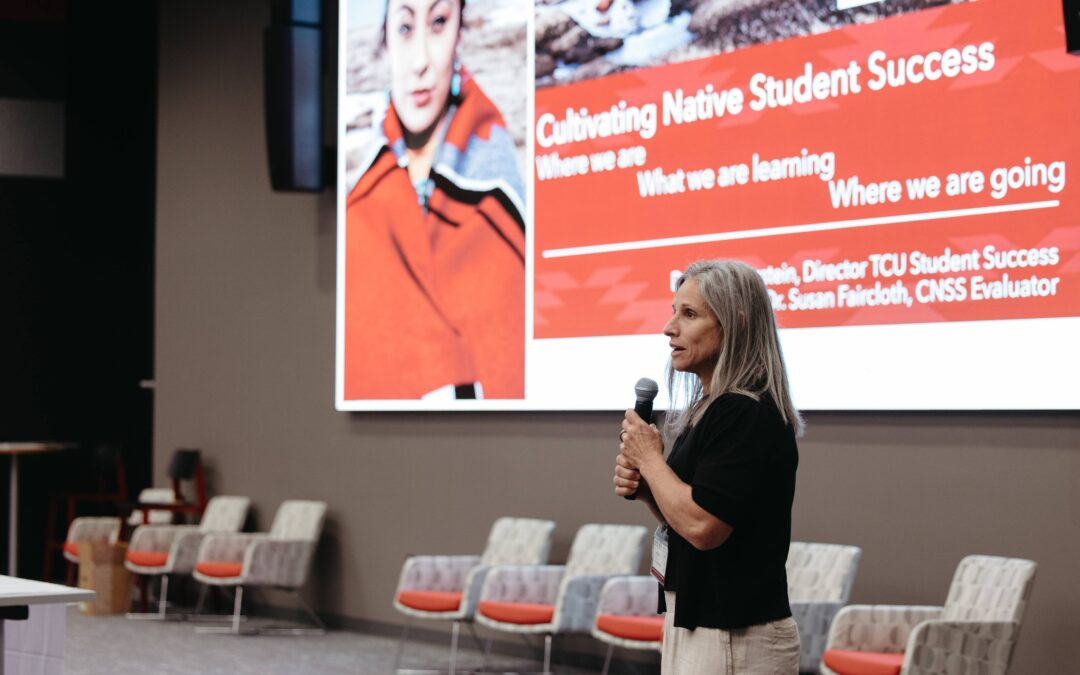American Indian College Fund Faculty Fellowships Develop Teaching and Research Expertise at Tribal Colleges and Universities
Programs Support Faculty and Staff Seeking Master’s and Terminal Degrees
August 15, 2023, Denver, Colo.— The American Indian College Fund (College Fund) awarded fellowships totaling $213,500 to 12 tribal college and university (TCU) faculty and staff in the spring of 2023. These fellowships support faculty pursuing graduate credits, master’s, or doctoral degrees. The College Fund’s faculty fellowship programs are creating greater education expertise in Indian Country, while building the academic and intellectual capacity of the 35 tribal colleges and universities it supports.
The spring 2023 cohort of fellows includes faculty from 10 TCUs.
The Mellon Doctoral Dissertation Fellowship was established in 2004 and the Mellon Master’s and Graduate Hours Fellowships were established in 2013. In partnership with the Andrew W. Mellon Foundation, the College Fund aims to increase and retain the number of faculty members with graduate credits or a degree in the humanities at the 35 accredited TCUs. The Mellon Doctoral Dissertation Fellow is:
-
- Ryan Winn, liberal studies faculty at College of Menominee Nation, Ph.D. in Indigenous literature and cultural theory.
The Mellon Master’s and Graduate Hours Fellows are:
-
- Jamison Banks (Seneca-Cayuga Nation), studio arts instructor at Institute of American Indian Arts, M.F.A. in cultural administration.
- Thomas Hokanson, social and behavioral science faculty member at Red Lake Nation College, graduate credits in geography.
- Stephanie Jackson (Saginaw Chippewa Indian Tribe descendant), Native American art instructor at Saginaw Chippewa Tribal College, M.A. in arts management and entrepreneurship.
- Todd Van Deslunt, adjunct instructor and writing lab coordinator at Lac Courtes Oreilles Ojibwe Community College, M.A. in composition.
The College Fund Doctoral Dissertation and Master’s Fellowship programs were established in 2021 to support faculty pursuing a graduate degree. By promoting graduate and terminal degrees among faculty, the College Fund helps develop skilled leaders who have already demonstrated their commitment to TCUs. Fellowships are open to faculty pursuing degrees in any field of study.
The College Fund Doctoral Dissertation Fellowship is awarded to faculty who have completed their doctoral coursework, have entered the dissertation phase, and will complete their degree within one year. Fellows include:
-
- Mark Clytus, biology faculty at San Carlos Apache College, Ph.D. in American Indian studies.
- Shaina Nez (Diné), senior lecturer of creative writing and English at Diné College, Ph.D. in Justice Studies.
- Sarah Vande Corput, letters and science faculty at College of Menominee Nation, Ed.D. in higher education and leadership studies.
The College Fund Master’s Fellowship is awarded to faculty who have been accepted to or are enrolled in a master’s program. The College Fund Master’s Fellow is:
-
- Justin Brierley, adjunct faculty of film and sound at Institute of American Indian Arts, M.F.A. in cultural administration.
- The Blanchard Pre-Dissertation Fellowship supports faculty at two- and four- year TCUs pursuing a doctoral degree. Fellows include:
- Matthew Fibla-Yates (Muscogee [Creek] Nation), tribal services department head and faculty member at College of the Muscogee Nation, doctorate in business administration.
- Jamie Figueroa, creative writing faculty at Institute of American Indian Arts, Ph.D. in visionary practice and regenerative leadership.
- Bobbi Frederick (Crow Creek Sioux Tribe), adjunct art instructor at Turtle Mountain Community College, Ed.D. in educational leadership and innovation.
About the American Indian College Fund— The American Indian College Fund has been the nation’s largest charity supporting Native higher education for 33 years. The College Fund believes “Education is the answer” and provided $14.45 million in scholarships and other direct student support to American Indian students in 2021-22. Since its founding in 1989 the College Fund has provided more than $284 million in scholarships, programs, community, and tribal college support. The College Fund also supports a variety of academic and support programs at the nation’s 35 accredited tribal colleges and universities, which are located on or near Indian reservations, ensuring students have the tools to graduate and succeed in their careers. The College Fund consistently receives top ratings from independent charity evaluators and is one of the nation’s top 100 charities named to the Better Business Bureau’s Wise Giving Alliance. For more information about the American Indian College Fund, please visit www.collegefund.org.
Journalists—The American Indian College Fund does not use the acronym AICF. On second reference, please use the College Fund.










